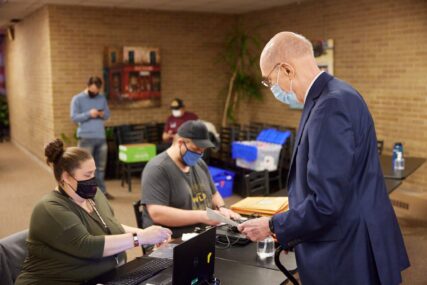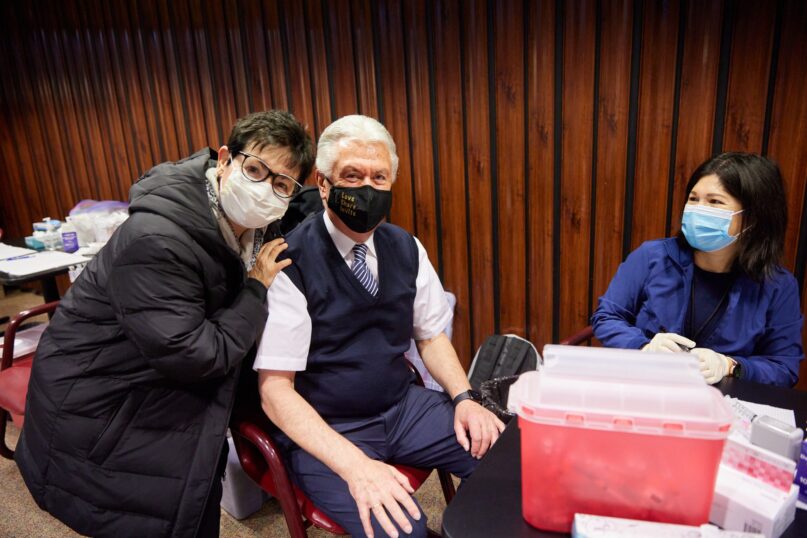With approval from our physician, my wife, Wendy, and I were vaccinated today against COVID-19. We are very grateful….
Posted by Russell M. Nelson on Tuesday, January 19, 2021
On Tuesday, eight top leaders of the Church of Jesus Christ of Latter-day Saints received their first vaccine dose against Covid-19, modeling pro-social behavior that the Church is also urging its members to undertake. To that end, the Church also issued a formal statement in support of vaccinations.
I am cheering for this public display of reason and sanity in the wake of conspiracy theories and disinformation. Let’s take a look at what the Church said — and did.
The Church’s statement opens with some history of its overall approach to vaccines.
In word and deed, The Church of Jesus Christ of Latter-day Saints has supported vaccinations for generations. As a prominent component of our humanitarian efforts, the Church has funded, distributed and administered life-saving vaccines throughout the world. Vaccinations have helped curb or eliminate devastating communicable diseases, such as polio, diphtheria, tetanus, smallpox and measles. Vaccinations administered by competent medical professionals protect health and preserve life.
So, we start with a pro-vax shot across the bow: the Church not only supports vaccinations in general but has funded them across the globe as part of its ongoing humanitarian efforts.
This public statement is made personal by what President Russell M. Nelson writes in the Facebook post above. The 96-year-old former surgeon reminds us that he remembers well what a total game-changer that the polio vaccine was in the 1950s, when he was a young doctor.
“I then watched the dramatic impact that vaccine had on eradicating polio as most people around the world were vaccinated,” Nelson writes.
He was an eyewitness to history. Sometimes, it’s a problem when a church that needs to be nimble for the modern age is led by people in their 80s and 90s. At other times — like right now — it can be advantage. Our church is led by someone who does not take the advances of science for granted, because he remembers what it was like to live (and practice medicine) without them.
When it comes to vaccines, Americans need that kind of collective memory. A personal witness can be powerful. Here’s mine: When I was a kid, I had one of the worst cases of the chicken pox our family doctor had ever seen. It was not life-threatening, of course, but it was acutely miserable. When I recovered my dad told me the story about how, when he was a kid, he had contracted polio and nearly died. Then there was a vaccine, which parents everywhere saw as a godsend (and kids too, because it meant that swimming pools could reopen).
He told me this because I had been vaccinated against polio and would never understand what things had been like otherwise. Maybe someday there would be a vaccine against the chicken pox too. Maybe my own children would not have to suffer from the illness like I had.
He was right. By the time I became a parent, there was a chicken pox vaccine. With every generation, we’ve come a little closer to eradicating disease. Except now the anti-vax movement is actually sending us in reverse: measles, once considered vanquished, is back with a vengeance because people mistakenly believe the vaccine against it, rather than the disease itself, is what puts their children at risk. They’ve convinced themselves that measles, which used to kill two to three million people every year before the vaccine became available, is a harmless childhood rite of passage, like the chicken pox was for me — uncomfortable but not dangerous.
They are dangerously wrong.
The Church statement continues:
As this pandemic spread across the world, the Church immediately canceled meetings, closed temples, and restricted other activities because of our desire to be good global citizens and do our part to fight the pandemic.
Now, COVID-19 vaccines that many have worked, prayed, and fasted for are being developed, and some are being provided. Under the guidelines issued by local health officials, vaccinations were first offered to health care workers, first responders, and other high-priority recipients. Because of their age, Senior Church leaders over 70 now welcome the opportunity to be vaccinated.

President Henry B. Eyring of the First Presidency prepares to receive the first dose of a COVID-19 vaccine in Salt Lake City on Tuesday, January 19, 2021. Ⓒ2021 by Intellectual Reserve, Inc. All rights reserved.
I appreciate the way the Church has taken the Covid virus seriously, even from the very beginning, even if many of its members have not. And I appreciate the way it has portrayed activities like wearing masks and staying home as prosocial behavior.
Last month, an apostle said that wearing masks during the pandemic was “a sign of Christlike love,” and said the Church and its members would be judged by the way we treat the vulnerable and the disadvantaged.
We see that again here, in the language of being good global citizens. (And the statement bends over backwards to make it clear that part of being good global citizens is to wait your turn for a vaccine: the Church leaders who were vaccinated this week did so because the state of Utah is now offering the shot to anyone over the age of 70. No one jumped the queue.)
And now for the money quote:
As appropriate opportunities become available, the Church urges its members, employees and missionaries to be good global citizens and help quell the pandemic by safeguarding themselves and others through immunization. Individuals are responsible to make their own decisions about vaccination. In making that determination, we recommend that, where possible, they counsel with a competent medical professional about their personal circumstances and needs.
There’s no mandate here — just a request that members do what leaders have done in getting the vaccine under the guidance of a medical professional. Again, there’s the language of being good global citizens. Citizens who do not wish to spread disease to their neighbors.
Lest there be any confusion, the Church’s statement is accompanied by a series of photos that aim to demystefy the vaccination process step by step. We see paperwork. We see syringes, Band-Aids and gloved hands. And we see images of one leader after another baring their arms and submitting to the shot.
Let’s hope the sight helps to convince more church members that vaccinations are safe and important. Judging from some of the comments on President Nelson’s Facebook post, a vocal minority are already pushing back.

Elder Dieter F. Uchtdorf and his wife, Harriet, prepare to receive the first dose of a COVID-19 vaccine on Tuesday, January 19, 2021, in Salt Lake City. Ⓒ2021 by Intellectual Reserve, Inc. All rights reserved.
Related columns:
Dear Mormons, please take coronavirus seriously






